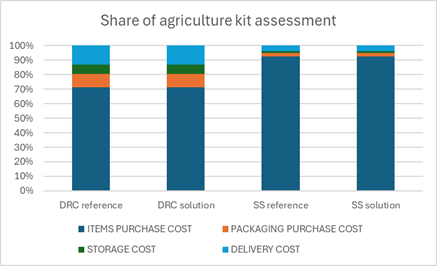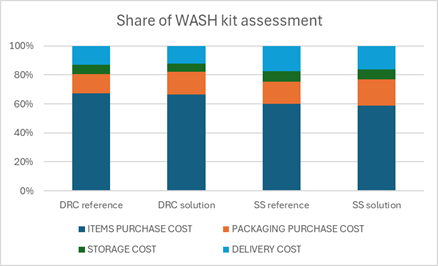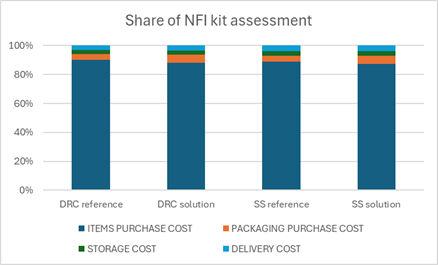First Insights from the Life Cycle Costing of Humanitarian Aid Kits
As part of the Bio4HUMAN EU-funded project, a Life Cycle Costing (LCC) has been conducted to better understand the economic dimension of humanitarian aid kits and to address the solid waste challenges. This analysis is a part of a broader life cycle approach, aimed at supporting more informed decisions that balance cost efficiency with environmental and social sustainability.
LCC evaluates costs across all stages of a product’s life cycle, from production and packaging to transport and storage.
Method and Scope
The first LCC analysis focused on four types of humanitarian aid kits: food kits, WASH (Water, Sanitation and Hygiene) kits, agricultural kits and Non-Food item (NFI) kits.
Those kits, as well as the reference data on product prices, were first defined and provided by Bio4HUMAN’s humanitarian aid-providing partners: People in Need (PIN) and Polish Humanitarian Action (PAH). Packaging costs were then separated from items’ price, thanks to the raw materials market price. Final deliveries were considered by truck transport distance for South Sudan, and a 300 km distance for the Democratic Republic of Congo (DRC). A one-month storage period was included.
It is important to note that the item costs provided by PIN and PAH already include part of the distribution costs (linked to procurement and upstream logistics) which could not be disaggregated from the item costs. The “delivery” cost shown in the analysis, therefore, refers specifically to the final delivery leg (last-mile transportation step, from storage to distribution point). The mass and volume of kits used to promote this analysis are internal estimations.
Each kit was assessed in two versions:
- Reference kits: current market products and packaging
- Bio-based kits: innovative biobased solutions identified by Bio4HUMAN such as biodegradable films, bio-based adhesives, compostable pouches, and PLA bottles
These results represent a first case study and are not finalised assessments.
Key Results
Across all kits and both regions, the analysis shows that:
- Items remain the largest cost contributor, though they already embed part of the distribution costs.
- Packaging costs are significant, especially for food and WASH kits.
- Introducing bio-based packaging results in a modest cost increase of about 2–4%.
- Final delivery (last-mile transport) is a key cost component, particularly in food and WASH kits.
- Storage costs are comparatively small but steady across all kits.
- Item solutions do not present a siginificant difference compared to the reference item’s cost.
Looking Ahead
These initial findings highlight the trade-offs faced by humanitarian organisations: bio-based solutions may slightly increase costs, but they can offer environmental benefits and contribute to reducing plastic waste.
The next step for the Bio4HUMAN team will be to integrate economic results (LCC) with the environmental life cycle assessment (LCA) and social life cycle assessment, providing a full life-cycle perspective. This integrated approach will help humanitarian actors to design more sustainable aid operations in the future.



